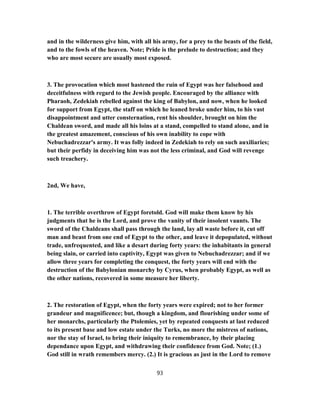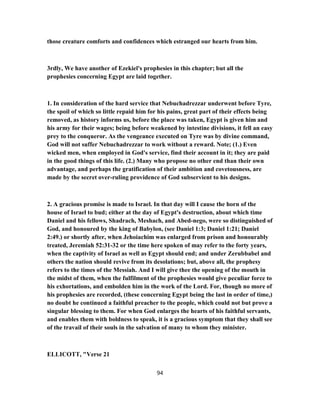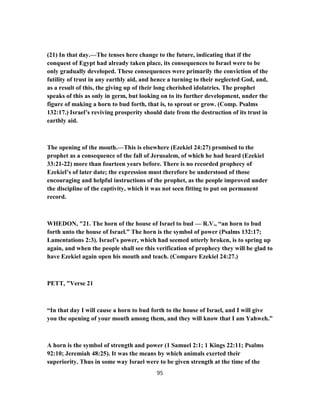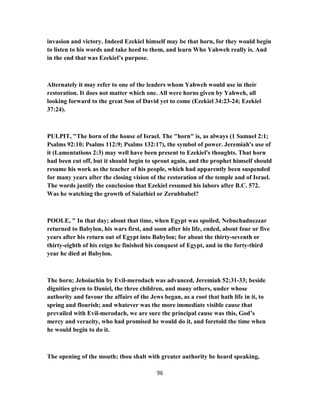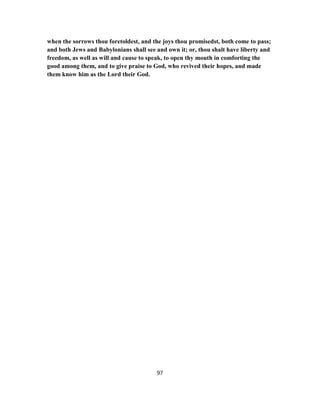This document provides commentary on Ezekiel 29 from multiple scholars. It summarizes the key points of the prophecy against Egypt in Ezekiel 29. The prophecy predicts the destruction of Pharaoh and Egypt's might by God. Pharaoh is compared to a great dragon lying in the rivers of Egypt, thinking he created the land and its power. God will remove Pharaoh from Egypt and cast him in the desert to be food for beasts. Egypt will be made desolate for 40 years as punishment for relying on their own strength rather than God. The commentary provides historical context and analyzes the symbolism and imagery used in the prophecy.
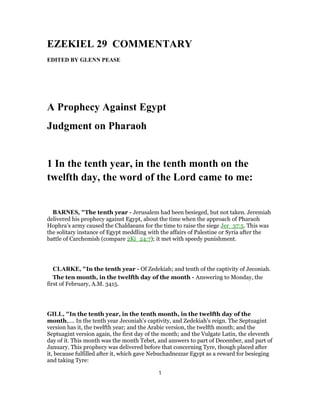


![overthrown by God. God will draw the crocodile Pharaoh out of his Nile with hooks, and
cast him upon the dry land, where he and the fishes that have been drawn out along with
him upon his scales will not be gathered up, but devoured by the wild beasts and birds of
prey. The figure is derived from the manner in which even in ancient times the crocodile
was caught with large hooks of a peculiar construction (compare Herod. ii. 70, and the
testimonies of travellers in Oedmann's Vermischten Sammlungen, III pp. 6ff., and
Jomard in the Déscription de l'Egypte, I p. 27). The form חחיים with a double Yod is a
copyist's error, probably occasioned by the double Yod occurring after ח in ֶיי ָח ְל ִ,בּ
which follows. A dual form for ים ִח ַח is unsuitable, and is not used anywhere else even by
Ezekiel (cf. Eze_19:4, Eze_19:9, and more especially Eze_38:4).
The fishes which hang upon the scales of the monster, and are drawn along with it out
of the Nile, are the inhabitants of Egypt, for the Nile represents the land. The casting of
the beast into the wilderness, where it putrefies and is devoured by the beasts and birds
of prey, must not be interpreted in the insipid manner proposed by Hitzig, namely, that
Pharaoh would advance with his army into the desert of Arabia and be defeated there.
The wilderness is the dry and barren land, in which animals that inhabit the water must
perish; and the thought is simply that the monster will be cast upon the desert land,
where it will finally become the food of the beasts of prey.
COFFMAN, "FIRST OF FOUR CHAPTERS DIRECTED AGAINST EGYPT
"The first sixteen verses here are an introduction to the entire four chapters against
Egypt. They describe the fate of Egypt, cite the sins of which she was guilty and
indicate the nature of her judgment, and her future place among the nations of the
world."[1]
Ezekiel has seven oracles against Egypt, the first two of which are in this chapter:
(1) Ezekiel 29:1-16; (2) Ezekiel 29:17-21; (3) Ezekiel 30:1-19; (4) Ezekiel 30:20-26;
(5) Ezekiel 31; (6) Ezekiel 32:1-16; and (7) Ezekiel 32:17-32.
The date of this prophecy is specific. "It was a year and two days after
Nebuchadnezzar began the siege of Jerusalem, and seven months before its
destruction."[2] This was in January, 587 B.C.[3] "This was about the time when
Pharaoh Hophra's approach toward Jerusalem with an army caused
Nebuchadnezzar temporarily to lift the siege, as recorded in Jeremiah 37:5.[4]
4](https://image.slidesharecdn.com/ezekiel29commentary-170120203858/85/Ezekiel-29-commentary-4-320.jpg)
![The chapter naturally falls into these divisions: (1) the crocodile captured and
destroyed (Ezekiel 29:1-7); (2) the allegory applied (Ezekiel 29:8-12); (3) the
restoration of Egypt after forty years (Ezekiel 29:13-16); (4) Egypt awarded to
Nebuchadnezzar as `wages' for his ruin of Tyre (Ezekiel 29:17-20); and (5) a
glimpse of a New Age for Israel (Ezekiel 29:21).
THE CROCODILE CAPTURED AND DESTROYED
Ezekiel 29:1-7
"In the tenth year, in the tenth month, in the twelfth day of the month, the word of
Jehovah came unto me, saying, Son of man, set thy face against Pharaoh king of
Egypt; speak, and say, thus saith the Lord Jehovah: Behold, I am against thee,
Pharaoh king of Egypt, the great monster that lieth in the midst of his rivers, that
hath said, My river is mine own, and I have made it for myself. And I will put hooks
in thy jaws, and I will cause the fish of thy rivers to stick unto thy scales: and I will
bring thee up out of the midst of thy rivers, with all the fish of thy rivers which stick
unto thy scales. And I will cast thee forth into the wilderness, thee and all the fish of
thy rivers: thou shalt fall upon the open field; thou shalt not be brought together,
nor gathered; I have given thee for food to the beasts of the earth and to the birds of
the heavens. And all the inhabitants of Egypt shall know that I am Jehovah, because
they have been a staff of reed to the house of Israel. When they took hold of thee by
the hand, thou didst break, and didst rend all their shoulders; and when they leaned
upon thee, thou brakest, and madest all their loins to be at a stand."
"The twelfth day of the month ..." (Ezekiel 29:1). F. F. Bruce gave this day as the
7th of January, 587 B.C.[5]
"The great monster that lieth in the midst of his rivers ..." (Ezekiel 29:3). The word
here means crocodile, an appropriate symbol indeed for Pharaoh and his nation. He
was a terrible looking monster, not nearly as dangerous as he looked, lethargic and
inactive most of the time. Of course, some of our radical commentators
automatically find all kinds of mythological connections with a reference of this
5](https://image.slidesharecdn.com/ezekiel29commentary-170120203858/85/Ezekiel-29-commentary-5-320.jpg)
![kind; but as Cooke stated, "Mythological associations are foreign to this
context."[6] Furthermore, Pearson, writing in 1962, makes the same affirmation.[7]
Despite this, May, quoting some various readings, thought he found here some
reflections of Sumerian mythology."[8]
Historically, there is no excuse whatever for seeking sources here in ancient
mythology. The crocodile was a well-known symbol of Egypt, found on Roman coins
of that vintage, and being universally understood as a symbol of Egypt and its
Pharaohs.[9]
"The fish ... which stick to thy scales ..." (Ezekiel 29:4). This represents the subjects,
dependents, and allies of Pharaoh who would inevitably share in his ruin and
downfall.
"I have given thee for food to the beasts, etc ..." (Ezekiel 29:5). The death
prophesied here for Pharaoh was especially repulsive to the Egyptian, due to the
care they usually bestowed upon their dead bodies, especially those of the Pharaohs.
Two reasons are here assigned as the prior causes of the terrible punishment God
was bringing upon them. (1) Pharaoh had arrogated unto himself divine
prerogatives, in the same manner as the prince of Tyre, even claiming to have
created the Nile River! (Ezekiel 29:3). (2) Egypt had bitterly deceived and betrayed
Israel upon those occasions when, contrary to God's warning, that had formed
military alliances with Egypt. They had proved to be a "broken reed" indeed upon
which Israel had vainly depended for help. Still another reason is cited later in
Ezekiel 29:9b-16. (3) "Egypt possessed an exaggerated sense of self-sufficiency."[10]
COKE, "The judgment of Pharaoh for his treachery to Israel. The desolation of
Egypt. The restoration thereof after forty years. Egypt the reward of
Nebuchadrezzar. Israel shall be restored.
6](https://image.slidesharecdn.com/ezekiel29commentary-170120203858/85/Ezekiel-29-commentary-6-320.jpg)
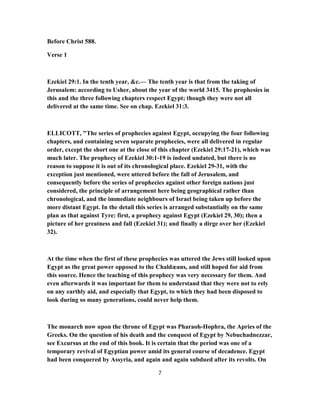
![the fall of Assyria it had thrown off all foreign yoke, and Hophra himself had made
a successful attack upon the Phœnicians, and had attempted to raise the siege of
Jerusalem, in which he momentarily succeeded, but was driven off by
Nebuchadnezzar. Not many years afterwards Egypt was finally subdued by the
Medo-Persian power, which succeeded the Chaldæan at Babylon, and never
regained its independence for any length of time. It continued a Persian satrapy
until it fell successively under the Greek, the Roman, and the Mameluke sway.
Verse 1
(1) In the tenth year, in the tenth month.—This was exactly a year and two days
after the investment of Jerusalem by Nebuchadnezzar (Ezekiel 24:1-2; 2 Kings
25:1), and about six months before its fall, or seven before its destruction (2 Kings
25:3-8). It must have been, therefore, after the time when the siege was temporarily
raised by the approach of the Egyptians under Pharaoh-Hophra (Jeremiah 37:5;
Jeremiah 37:11), and when Jeremiah prophesied the failure of that attempt
(Jeremiah 37:6-10); and probably was just when the news of that relief reached
Chaldæa, and gave fresh hope to the exiles of the deliverance of Jerusalem.
TRAPP, "Ezekiel 29:1 In the tenth year, in the tenth [month], in the twelfth [day] of
the month, the word of the LORD came unto me, saying,
Ver. 1. In the tenth year.] The year before Jerusalem was taken. [Ezekiel 24:1]
In the tenth month.] Called "Tebeth," [Esther 2:16] and it answereth to our
January, saith Bede. Chronology is the eye of prophecy, as well as of history.
PETT, "Verse 1-2
‘In the tenth year, in the tenth month, on the twelfth day of the month, the word of
Yahweh came to me saying, “Son of man, set your face against Pharaoh, king of
Egypt, and prophesy against him and against all Egypt.” ’
8](https://image.slidesharecdn.com/ezekiel29commentary-170120203858/85/Ezekiel-29-commentary-8-320.jpg)

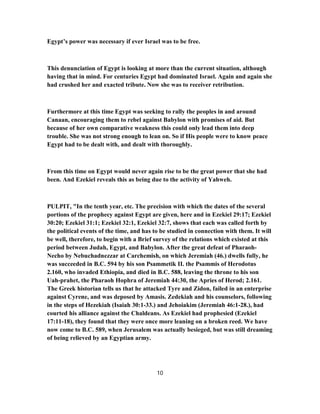
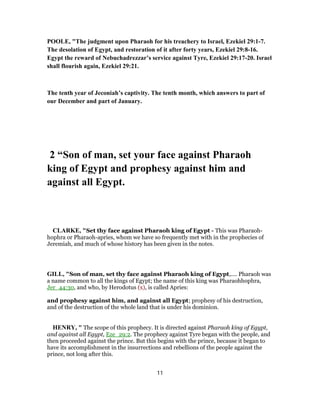
![JAMISON, "Pharaoh — a common name of all the kings of Egypt, meaning “the
sun”; or, as others say, a “crocodile,” which was worshipped in parts of Egypt (compare
Eze_29:3). Hophra or Apries was on the throne at this time. His reign began
prosperously. He took Gaza (Jer_47:1) and Zidon and made himself master of Phoenicia
and Palestine, recovering much that was lost to Egypt by the victory of Nebuchadnezzar
at Carchemish (2Ki_24:7; Jer_46:2), in the fourth year of Jehoiakim [Wilkinson,
Ancient Egypt, 1.169]. So proudly secure because of his successes for twenty-five years
did he feel, that he said not even a god could deprive him of his kingdom [Herodotus,
2.169]. Hence the appropriateness of the description of him in Eze_29:3. No mere
human sagacity could have enabled Ezekiel to foresee Egypt’s downfall in the height of
its prosperity. There are four divisions of these prophecies; the first in the tenth year of
Ezekiel’s captivity; the last in the twelfth. Between the first and second comes one of
much later date, not having been given till the twenty-seventh year (Eze_29:17; Eze_
30:19), but placed there as appropriate to the subject matter. Pharaoh-hophra, or
Apries, was dethroned and strangled, and Amasis substituted as king, by
Nebuchadnezzar (compare Jer_44:30). The Egyptian priests, from national vanity,
made no mention to Herodotus of the Egyptian loss of territory in Syria through
Nebuchadnezzar, of which Josephus tells us, but attributed the change in the succession
from Apries to Amasis solely to the Egyptian soldiery. The civil war between the two
rivals no doubt lasted several years, affording an opportunity to Nebuchadnezzar of
interfering and of elevating the usurper Amasis, on condition of his becoming tributary
to Babylon [Wilkinson]. Compare Jer_43:10-12, and see on Jer_43:13, for another view
of the grounds of interference of Nebuchadnezzar.
TRAPP, "Ezekiel 29:2 Son of man, set thy face against Pharaoh king of Egypt, and
prophesy against him, and against all Egypt:
Ver. 2. Set thy face against Pharaoh.] This was Pharaohhophra, whom Herodotus
(a) calleth Apries, and saith that he gave out that no god, how great soever, could
deprive him of his kingdom. Dionysius, the tyrant of Sicily, also was wont to say that
his kingdom was tied unto him with chains of adamant; but it proved otherwise.
Noli gloriari. Do not brag!
And against all Egypt.] Which held itself able to hold out against all the world, and
is therefore here threatened at large in this and the three next chapters.
POOLE, " Set thy face: see Ezekiel 20:46 21:2.
12](https://image.slidesharecdn.com/ezekiel29commentary-170120203858/85/Ezekiel-29-commentary-12-320.jpg)
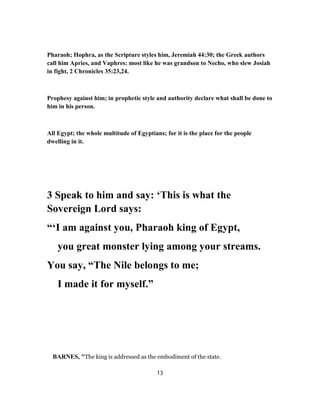
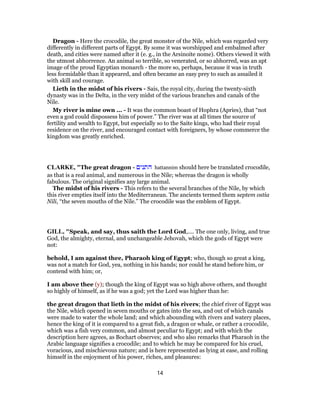
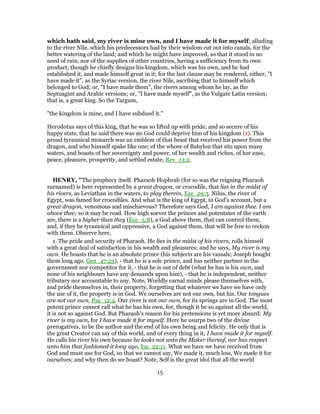
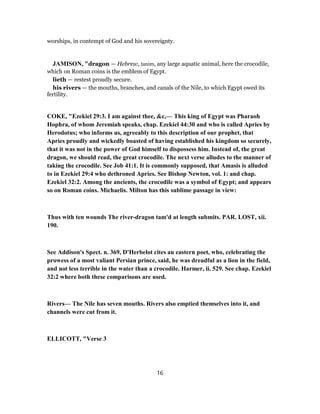
![(3) The great dragon.—This word is usually translated dragon in the English
version, but sometimes whale (Ezekiel 32:2), and (in a slightly modified form)
serpent (Exodus 7:9-10; Exodus 7:12). It unquestionably means crocodile, the
characteristic animal of Egypt, in some parts hated and destroyed, in some
worshipped as a deity, but in all alike feared, and regarded as the most powerful
and destructive creature of their country.
Lieth in the midst of his rivers.—Egypt, a creation of the Nile, and dependent
entirely upon it for its productiveness, is personified by the crocodile, its
characteristic animal, basking upon the sand-banks of its waters. The expression
“his rivers,” used of the branches of the Nile near its mouth, is peculiarly
appropriate to the Twenty-sixth Dynasty, to which Pharaoh-Hophra belonged,
whose capital was Sais, in the midst of the Delta.
My river is mine own.—This is characteristic of the pride of Hophra, who,
according to Herodotus, was accustomed to say that “not even a god could
dispossess him of power.” The whole dynasty to which he belonged, beginning with
Psammeticus, improved the river and encouraged commerce with foreign nations,
thereby acquiring great wealth.
TRAPP, "Ezekiel 29:3 Speak, and say, Thus saith the Lord GOD Behold, I [am]
against thee, Pharaoh king of Egypt, the great dragon that lieth in the midst of his
rivers, which hath said, My river [is] mine own, and I have made [it] for myself.
Ver. 3. The great dragon.] Or, Whale, or crocodile, the figure of Pharaoh; whose
princes also and people are fitly compared to lesser fishes, and Egypt to waters,
wherewith it aboundeth. These shall all suffer together, saith the prophet: Principis
enim calamitas, populi clades est. (a) Compare Psalms 74:13-14.
That lieth in the midst of his rivers.] That lieth at ease in the swollen waters of his
Nile, and battleth.
17](https://image.slidesharecdn.com/ezekiel29commentary-170120203858/85/Ezekiel-29-commentary-17-320.jpg)
![Which hath said, My river is mine own.] The river Nile watereth Egypt, and maketh
it fruitful beyond credulity. They do but cast in the seed, and have four rich
harvests in less than four months, say travellers. Hence the Egyptians were
generally proud, riotous, and superstitious above measure:
“ Nequitias tellus scit dare nulla magis. ”
- Plin., Paneg.
The most poisonous flies are bred in the sweetest fruit trees. See on 1 Timothy 6:17.
And I have made it for myself,] i.e., Useful and serviceable to my country with much
pains and expense, by ditches, channels, water courses, &c. These were cleansed and
repaired by the command of Augustus Caesar, when he had subdued Egypt, and
reduced it into a province. (b) Some render it, Ego feci me ipsum, I have made
myself; a most arrogant speech!
“ Sum felix; quis enim neget hoc? felixque manebo;
Hoc quoque quis dubitet? tutum me copia fecit.
Maior sum quam cui possit fortuna nocere. ” - Ovid.
WHEDON, " 3. Great dragon — In the Chinese Book of Changes the dragon is the
symbol of the sage and the king (Edkins, Ancient Symbolism, p. 9). The dragon of
the rivers (or, Nile canals, Exodus 7:17-24) must be the crocodile, which, even to this
day is called Pharaoh by the fellaheen. (Compare Job 41:13; Isaiah 27:1.)
18](https://image.slidesharecdn.com/ezekiel29commentary-170120203858/85/Ezekiel-29-commentary-18-320.jpg)
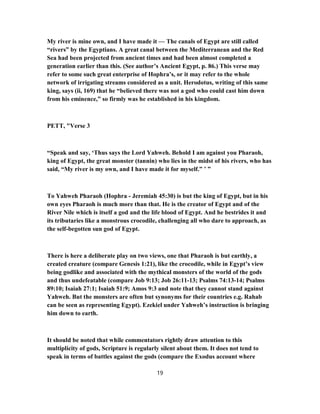
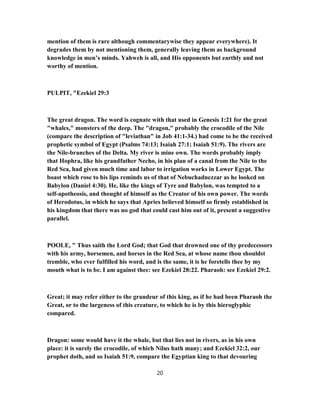



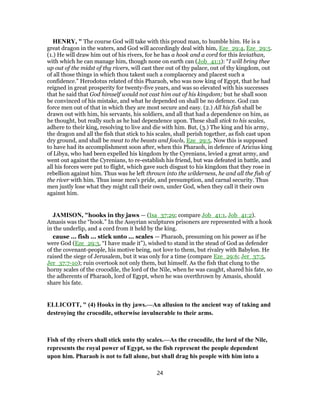
![common ruin.
TRAPP, "Ezekiel 29:4 But I will put hooks in thy jaws, and I will cause the fish of
thy rivers to stick unto thy scales, and I will bring thee up out of the midst of thy
rivers, and all the fish of thy rivers shall stick unto thy scales.
Ver. 4. But I will put hooks in thy jaws.] Speaking to Tyre, a sea town, sea
metaphors were made use of. Now he fetcheth them from waters and fishes, that he
may frame himself to his hearers. A good precedent for preachers.
To stick unto thy scales.] Thy subjects shall all follow thee into the field, that there
you may all fall together. Had they kept themselves in Egypt, they might have been
far safer; for that country could hardly be come at by an enemy. But they went
forth to meet their bane, as if they had been ambitions of destruction. God had a
holy hand in it.
WHEDON, "4. I will put hooks in thy jaws — So the crocodile was sometimes
caught (Herodotus, 2:70). The fish which stick to his scales represent the Egyptian
population and dependencies — such as Gaza and Jerusalem and other towns which
had foolishly trusted to the Pharaoh for help against the Assyrians.
PETT, "Verse 4
“And I will put hooks in your jaws, and I will cause the fish of your rivers, to stick
to your scales, and I will bring you up out of the midst of the rivers, with all the fish
of your rivers which stick to your scales.”
The picture is of a crocodile hunt, in which hooks were put in the crocodile’s mouth
so that he could be pulled ashore, and killed, or left high and dry to die. The fish
that stick to his scales may be foreign mercenaries, or allies, or the aristocracy and
armies of Egypt. So the great invincible Pharaoh can die like any other, along with
25](https://image.slidesharecdn.com/ezekiel29commentary-170120203858/85/Ezekiel-29-commentary-25-320.jpg)
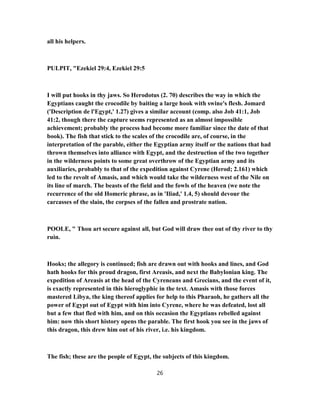

![fish of thy rivers,.... Where fish in common cannot live, but die as soon almost as out
of the water, and on dry land, excepting those that are of the amphibious kind. This
wilderness designs the deserts of Lybia and Cyrene, where the battle was fought between
Hophra and Amasis; and where the Egyptian army perished, only their king, before
compared to a crocodile, which lives on land, as well as in water, escaped. The Targum
is,
"I will cast thee into a wilderness, and all the princes of thy strength:''
thou shalt fall upon the open fields thou shalt not be brought together, nor
gathered, this is to he understood of his army; for what is proper to an army is
sometimes ascribed to the head or general of it; which fell by the sword in the fields of
Lybia and Cyrene and was so discomfited, that the remains of it could not be brought
and gathered together again: or the sense is, that those that were slain were left in the
open fields, and had no burial; they were not gathered to the grave, as Kimchi interprets
it; and so the Targum,
"upon the face of the field thy carcass shall be cast; it shall not be gathered, nor shall it
be buried:''
this was only true of the carcasses of the soldiers slain in battle, not of the king, who fled,
and afterwards in another battle was taken by Amasis, and strangled in the city of Sais,
where he was buried among his ancestors, as Herodotus (h) relates:
I have given thee for meat to the beasts of the field and to the fowls of the
heaven; that is, his army; as the armies of the kings, beast, and false prophet, will be at
the battle of Armageddon, when the two latter will be taken and cast alive into the
burning lake, of which this monarch was an emblem, Rev_19:17.
JAMISON, "wilderness — captivity beyond thy kingdom. The expression is used
perhaps to imply retribution in kind. As Egypt pursued after Israel, saying, “The
wilderness hath shut them in” (Exo_14:3), so she herself shall be brought into a
wilderness state.
open fields — literally, “face of the field.”
not be brought together — As the crocodile is not, when caught, restored to the
river, so no remnant of thy routed army shall be brought together, and rallied, after its
defeat in the wilderness. Pharaoh led an army against Cyrene in Africa, in support of
Aricranes, who had been stripped of his kingdom by the Cyrenians. The army perished
and Egypt rebelled against him [Junius]. But the reference is mainly to the defeat by
Nebuchadnezzar.
beasts ... fowls — hostile and savage men.
ELLICOTT, "(5) Open fields is synonymous with “wilderness” in the previous
clause. The crocodile and the fish together, drawn from the river, are to be thrown
upon the sands of the neighbouring desert, to be devoured by the birds and beasts of
prey: thus representing that Pharaoh and his people, uprooted from their power,
28](https://image.slidesharecdn.com/ezekiel29commentary-170120203858/85/Ezekiel-29-commentary-28-320.jpg)
![are to be given over for a spoil to various nations.
TRAPP, "Ezekiel 29:5 And I will leave thee [thrown] into the wilderness, thee and
all the fish of thy rivers: thou shalt fall upon the open fields; thou shalt not be
brought together, nor gathered: I have given thee for meat to the beasts of the field
and to the fowls of the heaven.
Ver. 5. And I will leave thee thrown into the wilderness.] As fish when they are
caught are cast upon the dry land, and there they die: for how should a fish live out
of his own element? It may be the Chaldees fought Pharaoh and his forces in the
wilderness, killed him and cast him out unburied, which the heathens held a great
unhappiness: for they thought their ghosts could not pass the river Styx, but must
wander through hell’s waste wildernesses, unless their dead bodies were buried.
I have given thee for meat.] Whale’s flesh is no better worth.
PETT, "Verse 5
“And I will leave you stranded in the wilderness, you and all the fish of your rivers.
You will fall on the face of the field. You will not be brought together or gathered. I
have given you for meat to the beast of the earth and to the birds of heaven.”
The great crocodile and the fish will be left stranded out of their own environment,
in the waterless wilderness. Thus they will collapse and die, unable to rally
themselves against the enemy, and the scavengers, both beast and bird, will arrive to
tear them apart and eat them. Pharaoh and all his allies will be desolated and the
Nile god and the other gods of Egypt will not be able to help them.
A further interesting fact is that ‘the crocodile’ Hophra (588-569 B.C.) probably did
not receive a royal burial, which was considered extremely important for the
Pharaohs and all Egyptians, for history records that Ahmose II (Gr. Amasis),
29](https://image.slidesharecdn.com/ezekiel29commentary-170120203858/85/Ezekiel-29-commentary-29-320.jpg)
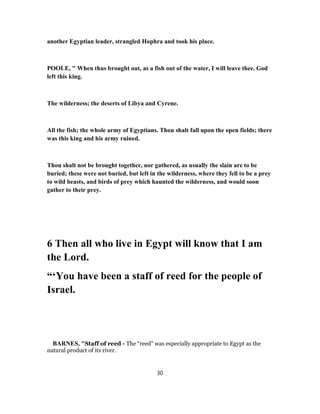
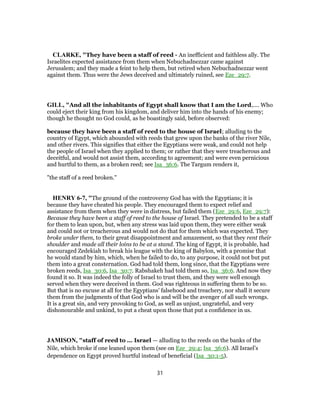
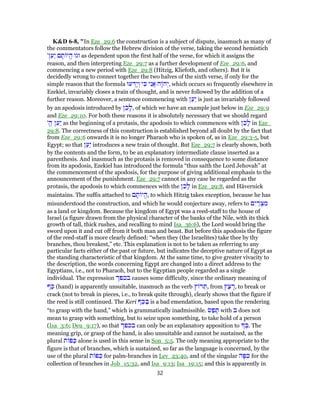
![perfect harmony with natural facts, since the tall reed of the Nile, more especially the
papyrus, is furnished with hollow, sword-shaped leaves at the lower part of the talk.
When it cracks, the reed-staff pierces the shoulder of the man who has grasped it, and
tears it; and if a man lean upon it, it breaks in pieces and causes all the loins to tremble.
יד ֱִמע ֶה cannot mean to cause to stand, or to set upright, still less render stiff and rigid.
The latter meaning cannot be established from the usage of the language, and would be
unsuitable here. For if a stick on which a man leans should break and penetrate his loins,
it would inflict such injury upon them as to cause him to fall, and not to remain stiff and
rigid. העמד cannot have any other meaning than that of ד ִע ְמ ִ,ה to cause to tremble or
relax, as in Psa_69:24, to shake the firmness of the loins, so that the power to stand is
impaired.
ELLICOTT, "Verse 6
(6) A staff of reed.—In Isaiah 36:6 the dependence of Judah upon Egypt is
described as trust “in the staff of this broken reed;” but notwithstanding all
warnings, they still trusted, especially at the time of this prophecy, and proved in
their experience the truth of the Divine word. The figure is taken from the reeds,
which grew abundantly on the banks of the Nile, and the statement is historically
amplified in the following verse, where the reference is to be understood not of any
single fact so much as of a continual, often repeated result. There should be a period
in the middle of Ezekiel 29:6, the first half forming the conclusion of the previous
denunciation, and the second half being closely connected with Ezekiel 29:7-9.
Ezekiel 29:7 is parenthetical.
TRAPP, "Ezekiel 29:6 And all the inhabitants of Egypt shall know that I [am] the
LORD, because they have been a staff of reed to the house of Israel.
Ver. 6. And all the inhabitants, &c.] Shall feel my power in their just destruction,
though they think themselves insuperable.
Because they have been a staff of reed.] See this fully expounded in the next words;
see also on Isaiah 36:6, Jeremiah 37:7-8. Egypt was a reedy country; as Pliny (a)
telleth us, Arando autem ipsa per se fluctuat, et in necessitate eludit.
33](https://image.slidesharecdn.com/ezekiel29commentary-170120203858/85/Ezekiel-29-commentary-33-320.jpg)
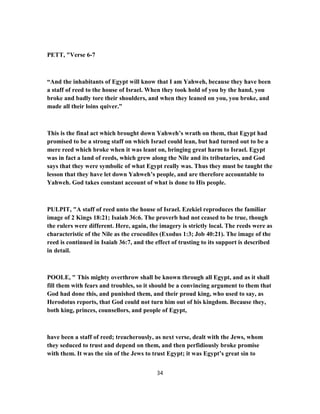
![falsify promise with the Jews, and for this God now punisheth Egypt.
7 When they grasped you with their hands, you
splintered and you tore open their shoulders;
when they leaned on you, you broke and their
backs were wrenched.[a]
BARNES, "(Eze 29:7) When they took hold of thee by thy hand, thou didst break, and
rend all their shoulder: and when they leaned upon thee, thou brakest, and madest all
their loins to be at a stand.
GILL, "When they took hold of thee by thy hand,.... When the Israelites entered
into an alliance and confederacy with the Egyptians, called for their assistance according
to treaty, and put their confidence in them:
thou didst break and rend all their shoulder; as a reed which a man puts under
his armhole, and leans upon, and it breaks under him, the splinters run into the flesh up
to the very shoulder, and tear the flesh to pieces; so, through Zedekiah's trusting to the
king of Egypt, he rebelled against the king of Babylon, which brought on his ruin, and
the destruction of his kingdom:
and when they leaned upon thee thou brakest, and madest all their loins to
be at a stand; when they put their confidence in the king of Egypt, and sent to him for
help when besieged by the king of Babylon, and he failed them, they were obliged to raise
up themselves, as a man is forced to do when his staff breaks under him, whose loins
before were bowed, but now erects himself, and stands and walks as well as he can
without it; so the Jews were forced to stand upon their own legs, and exert all the force
they had, and make all the efforts they could against the king of Babylon, being left in the
lurch by the king of Egypt; in which, though they were rightly served for their vain
35](https://image.slidesharecdn.com/ezekiel29commentary-170120203858/85/Ezekiel-29-commentary-35-320.jpg)
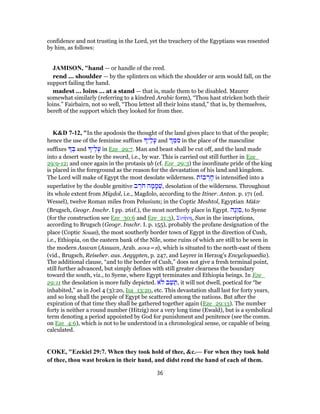
![When they leaned upon thee thou breakest, and didst loose or put out of joint all
their shoulders. Houbigant. Instead of, By thy hand, some read, With their hands;
and instead of, All their loins to be at a stand;—All their loins shake, or to be
pierced.
ELLICOTT, " (7) All their loins to be at a stand.—The expression is a difficult one,
but the more probable sense is, all their loins to shake. The reed breaks under the
weight of the man who leans upon it, and pierces his shoulder as he falls, while in his
consternation his loins tremble.
TRAPP, "Ezekiel 29:7 When they took hold of thee by thy hand, thou didst break,
and rend all their shoulder: and when they leaned upon thee, thou brakest, and
madest all their loins to be at a stand.
Ver. 7. When they took hold of thee by thy hand,] i.e., Made a covenant with thee,
and hoped for help from thee. See Job 8:20. The Holy Scripture is its own best
interpreter.
Thou didst break.] So unfaithful are many friends, so uncertain are all human
helps.
And madest all their loins to be at a stand.] Thou leftest them in the lurch, as we say,
to shift for themselves as they could.
WHEDON, " 7. Took, etc. — All verbs in present tense.
By thy — Rather, with thee.
Shoulder — LXX., hand (Isaiah 26:6).
37](https://image.slidesharecdn.com/ezekiel29commentary-170120203858/85/Ezekiel-29-commentary-37-320.jpg)
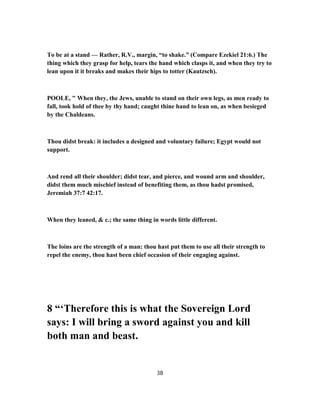
![GILL, "Therefore thus saith the Lord God,.... Because of the pride of the king of
Egypt, asserting the river to be his own, and made by him for himself; and because of his
perfidy to the house of Israel:
behold, I will bring a sword upon thee; or those that kill with the sword, as the
Targum; first a cival war, occasioned by the murmurs of the people, on account of the
defeat of their army at Cyrene; which issued in the dethroning and strangling of this
king, as before observed and setting up another; which cival commotions
Nebuchadnezzar took the advantage of, and came against Egypt with a large army:
and cut off man and beast out of thee; for what with the civil wars among
themselves, and what with the devastations of the king of Babylon's army, putting men
to the sword, and seizing upon the beasts for their food, to support such an army in a
foreign land, it was pretty well stripped of both.
JAMISON, "a sword — Nebuchadnezzar’s army (Eze_29:19). Also Amasis and the
Egyptian revolters who after Pharaoh-hophra’s discomfiture in Cyrene dethroned and
strangled him, having defeated him in a battle fought at Memphis [Junius].
COFFMAN, "Verse 8
"Therefore thus saith the Lord Jehovah: behold, I will bring a sword upon thee,
and will cut off from thee man and beast. And the land of Egypt shall be a
desolation and a waste; and they shall know that I am Jehovah. Because he hath
said the river is mine, and I have made it; therefore, behold, I am against thee, and
against thy rivers, and I will make the land of Egypt an utter waste and desolation,
from the tower of Seveneh, even unto the border of Ethiopia. No foot of man shall
pass through it, nor foot of beast shall pass through it, neither shall it be inhabited
forty years. And I will make the land of Egypt a desolation in the midst of the
countries that are desolate; and her cities among the cities that are laid waste shall
be a desolation for forty years; and I will scatter the Egyptians among the nations,
and will disperse them through the countries."
THE ALLEGORY APPLIED
39](https://image.slidesharecdn.com/ezekiel29commentary-170120203858/85/Ezekiel-29-commentary-39-320.jpg)
!["I will bring a sword upon thee ..." (Ezekiel 29:8). This was the sword of
Nebuchadnezzar, identified in Ezekiel 29:17, below.
"A desolation for forty years ..." (Ezekiel 29:11,12). This is the big problem in this
prophecy, because nearly all of the scholars seem very sure that there was never
such a long period of desolation in the whole history of Egypt. However, there is too
much that men do not know about the history of those times to allow very much
dependence to be put in such opinions. Nebuchadnezzar did indeed capture Egypt,
following the fall of Tyre; and if what that ruthless ruler did to Jerusalem is any
gauge of what he probably did to Egypt, we may be very sure that Ezekiel's
prophecy was no exaggeration. Our inability to prove just exactly what all that
desolation was cannot in any manner detract from the most circumstantial and
accurate fulfillment of that later promise in this same prophecy regarding the
perpetual place of Egypt throughout following history, in which the perpetual
mediocrity of the nation was foretold. Our argument is that this portion of the
prophecy alone proves the divine inspiration of the whole prophecy, and the believer
should have no problem with trusting God for the fulfillment of the rest of it,
whether or not, modern commentators know all about it.
TRAPP. "Ezekiel 29:8 Therefore thus saith the Lord GOD Behold, I will bring a
sword upon thee, and cut off man and beast out of thee.
Ver. 8. And cut off man and beast.] With both which thou aboundest exceedingly, as
being a very fruitful country; populosa et pecorosa.
PETT, "Verse 8-9
“Therefore thus says the Lord Yahweh, Behold I will bring a sword on you, and will
cut off from you man and beast. And the land of Egypt will be a desolation and a
waste, and they will know that I am Yahweh, because he has said, ‘The River (Nile)
is mine, and I have made it’.”
40](https://image.slidesharecdn.com/ezekiel29commentary-170120203858/85/Ezekiel-29-commentary-40-320.jpg)
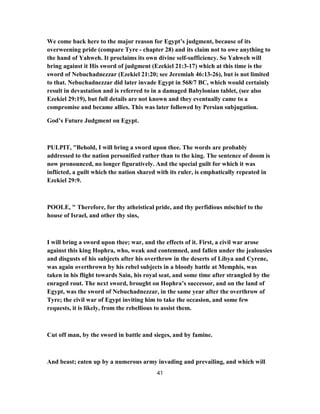
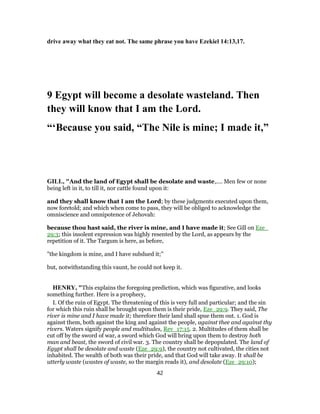
![neither men nor beasts shall pass through it, nor shall it be inhabited (Eze_29:11); it
shall be desolate in the midst of the countries that are so, Eze_29:12. This was the effect
not so much of those wars spoken of before, which were made by them, but of the war
which the king of Babylon made upon them. It shall be desolate from one end of the land
to the other, from the tower of Syene even unto the border of Ethiopia. The sin of pride
is enough to ruin a whole nation. 4. The people shall be dispersed and scattered among
the nations (Eze_29:12), so that those who thought the balance of power was in their
hand should now become a contemptible people. Such a fall does a haughty spirit go
before.
JAMISON, "I am the Lord — in antithesis to the blasphemous boast repeated here
from Eze_29:3, “The river is mine, and I have made it.”
ELLICOTT, " (9) Because he hath said.—Again, as in Ezekiel 29:6, the division of
the verses is very unfortunate. The expression “shall know that I am the Lord,” so
common in Ezekiel, always closes a train of thought. The new sentence begins with
the reason for the judgment upon Egypt—because of its pride.
TRAPP, "Verse 9
Ezekiel 29:9 And the land of Egypt shall be desolate and waste; and they shall know
that I [am] the LORD: because he hath said, The river [is] mine, and I have made
[it].
Ver. 9. Because he hath said, The river is mine, and I have made it.] With this proud
speech he is twice twitted. {see Ezekiel 29:3} The Egyptians so trusted in their river
Nile, as if they needed no help from heaven.
“ Aegyptus sine nube ferax, ”
saith Claudian. (a) And Lucan to like purpose:
43](https://image.slidesharecdn.com/ezekiel29commentary-170120203858/85/Ezekiel-29-commentary-43-320.jpg)
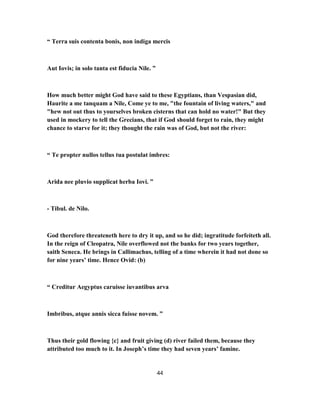
![POOLE, "Verse 9
The land of Egypt; that part here intended, say some, and in the 10th verse,
bounded from Syene to the borders of Ethiopia; nor is this inconsistent with that
Ezekiel 29:2, against all Egypt, for all Egypt suffered much, though all were not
equally wasted, and turned into a desolation, as these parts shall be. Desolate; a
desolation, i.e. most desolate, and wasteness by the sword of the enemy, and by
drought, as the word imports both: and this latter part of the judgment was
executed by the folly of the twelve Egyptian roitelets, who made a mighty lake,
Morris, to fill which they much drained and weakened Nilus, that it could not, as
before it did, water and fertilize the land; suitable to Isaiah 19:5.
He hath said, & c.: see Ezekiel 29:3.
10 therefore I am against you and against your
streams, and I will make the land of Egypt a ruin
and a desolate waste from Migdol to Aswan, as far
as the border of Cush.[b]
BARNES 10-12, "From the tower of Syene - Or, as in the margin, “Migdol”
(“tower”) was about two miles from Suez. “Syene” was the most southern town in Egypt,
on the borders of Ethiopia, in the Thebaid, on the eastern bank of the Nile. The modern
Assvan lies a little to the northeast of the ancient Syene.
We have no record of the circumstances of the Chaldsaean invasion of Egypt, but it is
possible that it did not take place until after the fall of Tyre. We gather of what nature it
45](https://image.slidesharecdn.com/ezekiel29commentary-170120203858/85/Ezekiel-29-commentary-45-320.jpg)
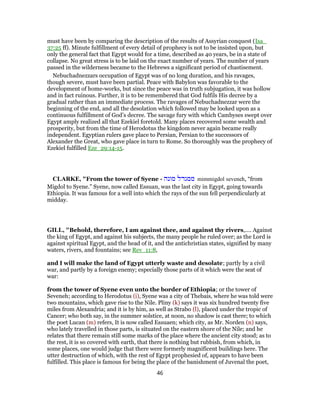
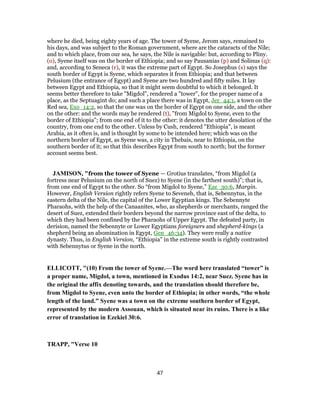
![Ezekiel 29:10 Behold, therefore I [am] against thee, and against thy rivers, and I will
make the land of Egypt utterly waste [and] desolate, from the tower of Syene even
unto the border of Ethiopia.
Ver. 10. And against thy rivers.] The jealous God will down with the earthly idol,
whatever it be. See on Ezekiel 29:9.
And I will make the land of Egypt utterly waste.] Heb., Waste of wastes.
From the tower of Syene,] i.e., From south to north.
WHEDON, "10. From the tower of Syene — Rather, as margin of A.V., “from
Migdol to Syene” (Sunnu). Migdol (Ezekiel 30:6; Exodus 45:2; Numbers 33:7;
Jeremiah 44:1; Jeremiah 46:14) was near to the ancient Pelusium (Tel Farama), and
was the great frontier city and recognized north boundary of Egypt in the time of
Ezekiel and Herodotus. This fort (Magdolon) guarded the point where the great
Syrian highways crossed the canal of Sesostris — the shortest route to Syria. (See F.
Ll. Griffith, Qantarah, pp. 100-103.) Syene (Assouan) was the southernmost town of
Upper Egypt, lying on the border of Nubia. The expression took in all Egypt, just as
“from Dan to Beer-sheba” meant all Palestine. (See Maspero, Recueil de Travaux en
Philippians et Arch., 1892.)
PETT, "Verses 10-12
“Therefore behold, I am against you and against your rivers, and I will make the
land of Egypt an utter waste and desolation from Migdol to Seveneh (Syene) even to
the border of Ethiopia. No foot of man shall pass through it, nor foot of beast shall
pass through it, neither will it be inhabited for forty years. And I will make the land
of Egypt a desolation in the midst of the countries that are desolate, and her cities
among the cities that are laid waste will be a desolation forty years, and I will scatter
48](https://image.slidesharecdn.com/ezekiel29commentary-170120203858/85/Ezekiel-29-commentary-48-320.jpg)

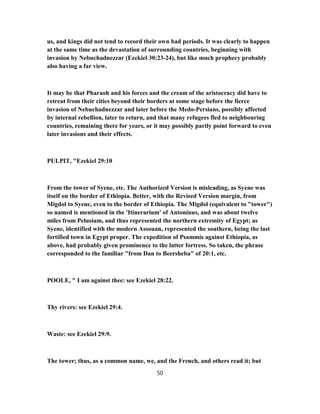

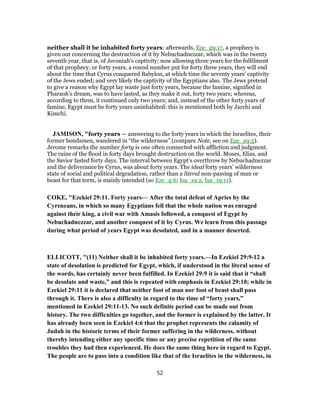
![which they were to endure the judgment of God upon their sins. This is expressed,
after the manner of Ezekiel, in strong concrete terms, the literal fulfilment of which
was neither intended nor expected.
TRAPP, "Ezekiel 29:11 No foot of man shall pass through it, nor foot of beast shall
pass through it, neither shall it be inhabited forty years.
Ver. 11. No foot of man or beast shall pass through it.] This was solitudo solitudinis
indeed, a dreadful desolation. When it happened no history mentioneth, but that it
was so is most sure. Oh the dismal effects of sin in all ages, as now in various parts
of Turkey, utterly unpeopled, though once flourishing!
WHEDON, "11. Neither shall it be inhabited forty years — This prophecy was
never literally fulfilled. It is a poetic description of the results of a campaign which
laid waste the country and interrupted the traffic. (Compare Ezekiel 4:6; Ezekiel
32:13.) The forty years is a symbolic number. (See introduction to chapter 40, and
general Introduction, VIII.) No one doubts that Egypt was in trouble at this very
time. The brave General Nes-Hor tells us on his funeral statue how the “Aamu
[Asiatics] and all the wretched Northerners from the land of Sati [Mesopotamia]
wasted and plundered” the country as far as Nubia, ravaging the temple at
Elephantine, etc. The fact that Nes-Hor claims to have driven back the invaders
before they plundered Nubia proves that they had at least reached Syene. (See note
Ezekiel 29:10.) It is more probable that the Aamu, being satisfied with their booty,
or being overcome with the heat, returned of their own accord. The Egyptians
claimed victories under such circumstances (Wiedemann, Zeits. fur Aeg. Sprach,
1878; Maspero and Brugsch, Zeits., 1884; Expositor, x; Tiele, Geschichte; Kuenen,
Onderzoek).
PULPIT, "Ezekiel 29:11
Neither shall it be inhabited forty years. It need hardly be said that history reveals
no such period of devastation. Nor, indeed, would anything but the most prosaic
literalism justify us in looking for it. We are dealing with the language of a poet-
53](https://image.slidesharecdn.com/ezekiel29commentary-170120203858/85/Ezekiel-29-commentary-53-320.jpg)

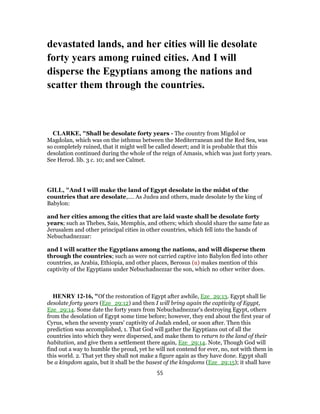
![but little wealth and power, and shall not extend its conquests as formerly; it shall be the
tail of the nations, and not the head. It is a mercy that it shall become a kingdom again,
but, to humble it, it shall be a despicable kingdom; it shall be a long time before it
recover any thing like its ancient lustre. For two reasons it shall be thus mortified: - (1.)
That it may not domineer over its neighbours, that it may not exalt itself above the
nations, nor rule over the nations, as it has done, but that it may know what it is to be
low and despised. Note, Those who abuse their power will justly be stripped of it; and
God, as King of nations, will find out a way to maintain the injured rights and liberties,
not only of his own, but of other nations. (2.) That it may not deceive the people of God
(Eze_29:16): It shall no more be the confidence of the house of Israel; they shall no
more be in temptation to trust in it as they have done, which is a sin that brings their
iniquity to remembrance, that is, provokes God to punish them not for that only, but for
all their other sins. Or it puts them in mind of their idolatries to return to them, when
they look to the idolaters, to repose a confidence in them. Note, The creatures we confide
in are often therefore ruined, because there is no other way effectually to cure us of our
confidence in them. Rather than Israel shall be ensnared again, the whole land of Egypt
shall be laid waste. He that once gave Egypt for their ransom (Isa_43:3) will now give
Egypt for their cure; and it shall be destroyed rather than Israel shall not in this
particular be reformed. God, not only in justice, but in wisdom and goodness to us,
breaks those creature-stays which we lean too much upon, and makes them to be no
more, that they may be no more our confidence.
JAMISON, "As Israel passed through a term of wilderness discipline (compare Eze_
20:35, etc.), which was in its essential features to be repeated again, so it was to be with
Egypt [Fairbairn]. Some Egyptians were to be carried to Babylon, also many “scattered”
in Arabia and Ethiopia through fear; but mainly the “scattering” was to be the
dissipation of their power, even though the people still remained in their own land.
COKE, "Ezekiel 29:12. Her cities—shall be desolate, &c.— We cannot prove
indeed, from heathen authors, that this desolation of the country continued exactly
forty years, though it is likely enough that this, as well as the other conquered
countries, did not shake off the Babylonish yoke till the time of Cyrus; but we are
assured by Berosus, that Nebuchadnezzar took several captives in Egypt, and
carried them to Babylon; and from Megasthenes we learn, that he transplanted and
settled others in Pontus. So true it is, that they were scattered among the nations,
and dispersed through the countries, and might, upon the dissolution of the
Babylonish empire, return to their native country. Newton, p. 362.
ELLICOTT, "(12) Scatter the Egyptians among the nations.—Megasthenes and
Berosus state that Nebuchadnezzar on his conquest of Egypt, sent great numbers of
the people captive to Babylon; others doubtless, as in similar cases, took refuge in
56](https://image.slidesharecdn.com/ezekiel29commentary-170120203858/85/Ezekiel-29-commentary-56-320.jpg)
![Ethiopia, Libya, and other neighbouring lands. The kind of desolation foretold for
Egypt is the same as that for “desolate” cities and countries that fell under the
power of the conqueror: they were to be plundered and reduced to subjection.
TRAPP, "Ezekiel 29:12 And I will make the land of Egypt desolate in the midst of
the countries [that are] desolate, and her cities among the cities [that are] laid waste
shall be desolate forty years: and I will scatter the Egyptians among the nations, and
will disperse them through the countries.
Ver. 12. In the midst of the countries.] Palestine, Moab, Edom, Judea, &c. See
Jeremiah 46:18-20
And her cities.] Which are said to have been twenty thousand in the reign of Amasis,
the chief whereof were Alexandria, Thebes, Babylon, Memphis, &c.
WHEDON, "12. I will scatter the Egyptians among the nations — Every oriental
conqueror took back with him strings of captives and gave them as slaves to his
soldiers and allies; but certainly there was no wholesale deportation of the people, as
in the case of Israel and Judah. (Compare Ezekiel 12:15.)
PULPIT, "Ezekiel 29:12
I will scatter the Egyptians among the nations. As before, records are silent as to
any such dispersion. All that we can say is that such a deportation was uniformly
the sequel of the conquests of an Oriental king, as in the ease of the captivities of
Samaria (2 Kings 17:6) and Jerusalem, and of the nations that were settled in
Samaria (2 Kings 17:6), and of the Persians by Darius; that if we find reason to
believe that Egypt was invaded by Nebuchadnezzar after the destruction of
Jerusalem, we may assume, with little risk of doubt, that it was followed by what
Ezekiel describes.
57](https://image.slidesharecdn.com/ezekiel29commentary-170120203858/85/Ezekiel-29-commentary-57-320.jpg)
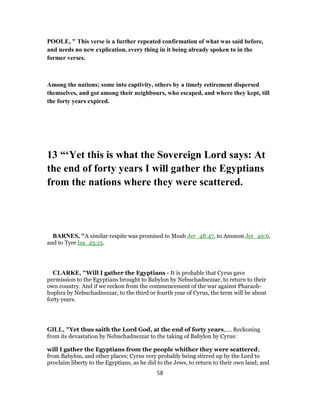
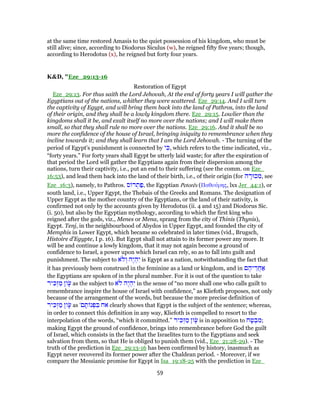
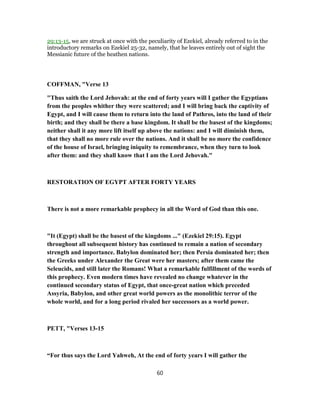

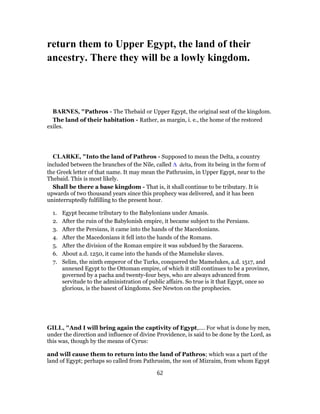
![had its name, Gen_10:14. Bochart takes it to be Thebais, a principal country in Egypt:
into the land of their habitation; or nativity, where they were born, and where they
before dwelt:
and they shall be there a base kingdom; as it is at this day more especially, to
which it has been gradually reduced, having passed into various hands, and come under
the power and dominion of different states: whatever might be the case and
circumstances of it under Cyrus, Cambyses his son entered into it, made sad devastation
in it, and an entire conquest of it; and though it revolted under Darius Hystaspes, it was
subdued again, and brought into a worse state than before by Xerxes: it revolted again in
the reign of Darius Nothus, and was at last by Ochus totally subdued; and from that time
the Egyptians never had a king of their own nation to reign over them. Along with the
Persian empire it came into the hands of Alexander without any opposition; and, after
his death, fell to the share of Ptolemy, one of his captains; and, though some of the first
kings of that name were of considerable note and power, yet Egypt made a poor figure
under the reigns of several of them. When the Roman empire obtained, it became a
province of that, and continued so for six or seven hundred years; and then it fell into
the hands of the Saracens, when it sunk into ignorance and superstition, the Mahometan
religion being established in it, with whom it continued until about the year of Christ
1250; when the Mamalucks, or Turkish and Carcassian slaves, rose up against their
sovereigns, the sultans of Egypt, and usurped the government, in whose hands it was
until the year 1517; when Selim the ninth, emperor of the Turks, conquered the
Mamalucks, and put an end to their government, and annexed it to the Ottoman empire;
of which it is a province to this day (x), being governed by a Turkish basha, with twenty
four begs or princes under him, who are raised, from being servants, to the
administration of public affairs; and so it is become a base kingdom indeed, if to be
called one (y).
JAMISON, "Pathros — the Thebaid, or Upper Egypt, which had been especially
harassed by Nebuchadnezzar (Nah_3:8, Nah_3:10). The oldest part of Egypt as to
civilization and art. The Thebaid was anciently called “Egypt” [Aristotle]. Therefore it is
called the “land of the Egyptians’ birth” (Margin, for “habitation”).
base kingdom — Under Amasis it was made dependent on Babylon; humbled still
more under Cambyses; and though somewhat raised under the Ptolemies, never has it
regained its ancient pre-eminence.
ELLICOTT, " (14) The land of Pathros.—Comp. Isaiah 11:11. Pathros is Upper
Egypt, the Thebaid. In the following clause this is described as “the land of their
birth” (Marg.). According to ancient testimony and the opinion of many moderns,
this was the original seat of Egyptian power. It may, however, be put only as the
part for the whole—Pathros for Egypt.
Shall be there a base kingdom.—Egypt should be restored, but not to its former
63](https://image.slidesharecdn.com/ezekiel29commentary-170120203858/85/Ezekiel-29-commentary-63-320.jpg)
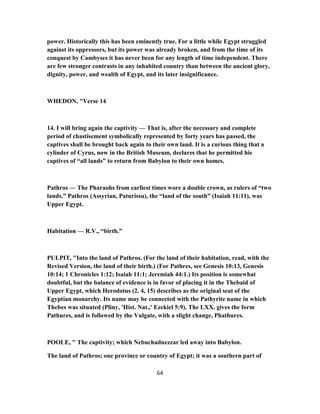
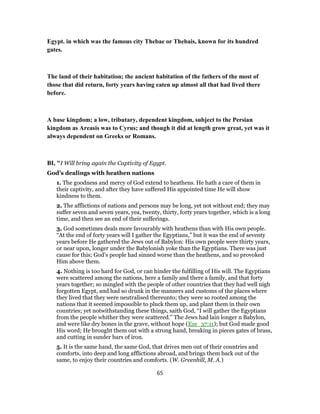
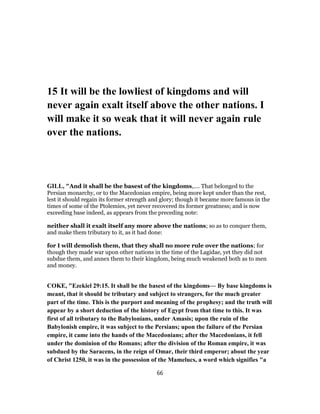
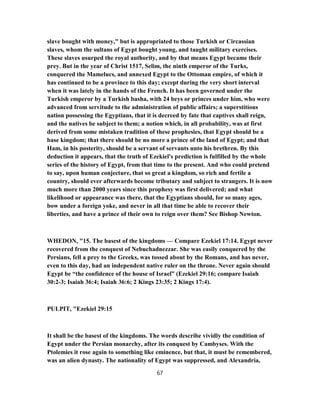
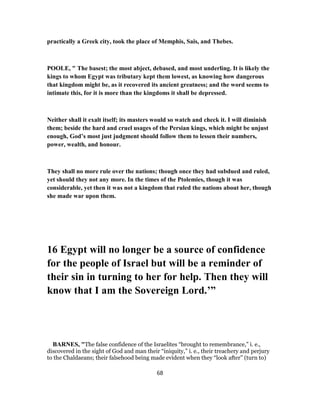
![the Egyptians and seek their aid in rebellion. The ruin of Egypt shall put an end to all
this.
GILL, "And it shall be no more the confidence of the house of Israel,.... It
having been treacherous to them, and moreover subdued by the Chaldeans, the Jews,
even after their return from captivity, put no more confidence in them; it being now
become as it is here prophesied it would, the basest of the kingdoms, more weak, and in
a more abject state, than the rest, and so despised by its neighbours, as it was by the
Jews:
which bringeth their iniquity to remembrance, when they shall look after
them; as they had done in time past, when they looked after them for help, and
expected it from them, and trusted in them, and served their idols; which brought to the
Lord's remembrance former iniquities and idolatries, for which he punished them; but
now they should do so no more:
but they shall know that I am the Lord God; not the Egyptians, but the Israelites;
who being returned from captivity, shall acknowledge and serve the only true God, and
no more worship the idols of the nations.
JAMISON, "Egypt, when restored, shall be so circumscribed in power that it shall be
no longer an object of confidence to Israel, as formerly; for example, as when, relying on
it, Israel broke faith with Nebuchadnezzar (Eze_17:13, Eze_17:15, Eze_17:16).
which bringeth their iniquity to remembrance, when they shall look after
them — rather, “while they (the Israelites) look to (or, turn after) them” [Henderson].
Israel’s looking to Egypt, rather than to God, causes their iniquity (unfaithfulness to the
covenant) to be remembered by God.
ELLICOTT, " (16) The confidence of the house of Israel.—Here the result of this
judgment in God’s providence concerning His people is brought out: they had
hitherto continually transgressed by looking to Egypt for aid; now this temptation
should be entirely removed. This trust of Israel in Egypt had continually brought
“their iniquity to remembrance when they looked” to them for help, both by its
being against the express command of God, and also by its involving treachery and
rebellion against Chaldæa.
WHEDON, "16. Bringeth their iniquity to remembrance — When Israel looked to
Pharaoh instead of to Jehovah for help, it made the national wickedness more
conspicuous than the national danger, and instead of helping, as he otherwise would
have done, Jehovah chastised. (Compare Ezekiel 21:23-24.)
69](https://image.slidesharecdn.com/ezekiel29commentary-170120203858/85/Ezekiel-29-commentary-69-320.jpg)
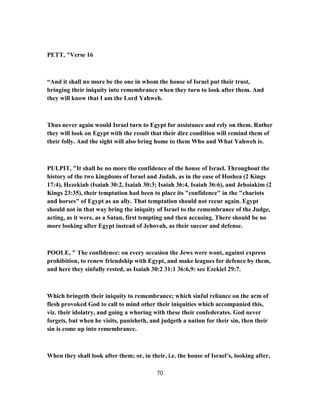

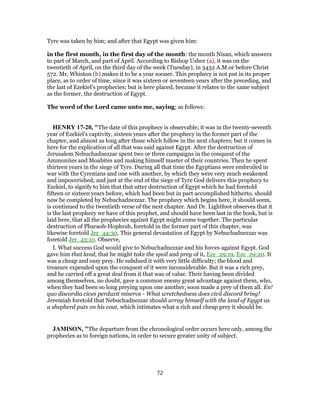
![COFFMAN, "Verse 17
"And it came to pass in the seveThe departure from the chronological order occurs
here only, among the prophecies as to foreign nations, in order to secure greater unity of
subject.
n and twentieth year, in the first month, in the first day of the month, the word of
Jehovah came unto me, saying, Son of man, Nebuchadnezzar king of Babylon
caused his army to serve a great service against Tyre: every head was made bald,
and every shoulder was worn; yet had he no wages, nor his army, from Tyre, for the
service that he had served against it. Therefore thus saith the Lord Jehovah:
Behold, I will give the land of Egypt unto Nebuchadnezzar king of Babylon; and he
shall carry off her multitude, and take her spoil, and take her prey; and it shall be
the wages for his army. I have given him the land of Egypt as his recompense for
which he served, because they wrought for me, saith the Lord Jehovah."
EGYPT GIVEN TO NEBUCHADNEZZAR AS "WAGES"
The date in Ezekiel 29:17, according to Bruce, is April 26,571 B.C.[11] This was
about a year after the end of the 13-year siege of Tyre. This, of course, is the last of
Ezekiel's prophecies chronologically; but it is included here because of the subject
matter. "The date given here is two years later than the vision of chapter 40."[12]
Despite the fall of Tyre and its subsequent domination under a high commissioner
from Babylon, Nebuchadnezzar received no significant spoil from its capture. Many
have suggested that perhaps Tyre had had sufficient time to ship all of their
treasures elsewhere. Egypt may well have been a cooperating partner with Tyre in
such a project, giving credence to Bruce's suggestion that such actions on Egypt's
part would have been a sufficient "casus belli" to result in Nebuchadnezzar's
immediate declaration of war against Egypt.[13]
Nebuchadnezzar appears here as "the servant of God" in his siege of Tyre, and his
eventual spoil of Egypt is seen as a God-given reward for him as compensation for
the failure of Tyre to yield any loot to her conquerors. "In all of Nebuchadnezzar's
73](https://image.slidesharecdn.com/ezekiel29commentary-170120203858/85/Ezekiel-29-commentary-73-320.jpg)
![campaigns, he was unconsciously carrying out the purposes of the Divine will (See
Jeremiah 25:9).[14]
McFadyen commented that "The appearance in this chapter of prophecies which
men have labeled as `untilled' may fairly be regarded as proof that in the mind of
Ezekiel they had been or indeed would be essentially fulfilled."[15]
There is no admission here that Nebuchadnezzar's mission against Tyre failed.
Jamieson tells us that Jerome, quoting Assyrian historians, expressly states that
Nebuchadnezzar succeeded.[16] Afterward from the long siege, "The power of Tyre
was broken, and she never regained her former greatness."[17]
ELLICOTT, " (17) In the seven and twentieth year.—This is the latest date among
all Ezekiel’s prophecies, and is more than sixteen years after the prophecy of the
former part of the chapter. This date corresponds with the thirty-fifth year of
Nebuchadnezzar’s reign (see 2 Kings 25:2; 2 Kings 25:8), and, from Ezekiel 29:18,
was evidently uttered after the close of the siege of Tyre. As that siege lasted thirteen
years, it must have been begun at least as early as Nebuchadnezzar’s twenty-second
year, or within three years after the destruction of Jerusalem. Josephus, however,
states (Antt. x. 9, § 7) that in the twenty-third year of his reign Nebuchadnezzar
made a successful expedition against Cælosyria, after which he brought the
Ammonites and Moabites into subjection, and then conquered Egypt. The two
former campaigns are consistent enough with the still progressing siege of Tyre; but
hardly the latter. We must, therefore, suppose a considerable interval between these
conquests, of which Josephus takes no notice.
The present utterance may have been either simultaneous with or only just before
the conquest of Egypt. Its most probable time is during the early part of the
campaign against Egypt.
This passage is placed with the other prophecies against Egypt in order to bring
them all together, and is assigned to this particular place, after the analogy of
Ezekiel 26:7, in order to bring the mention of the agent by whom the conquest is to
74](https://image.slidesharecdn.com/ezekiel29commentary-170120203858/85/Ezekiel-29-commentary-74-320.jpg)
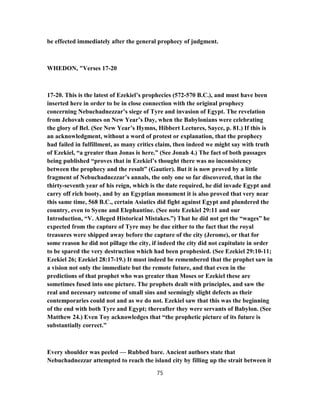

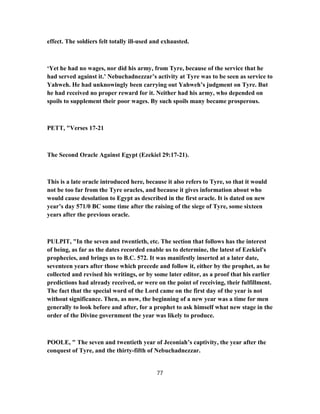
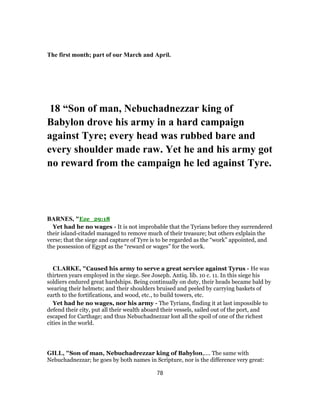


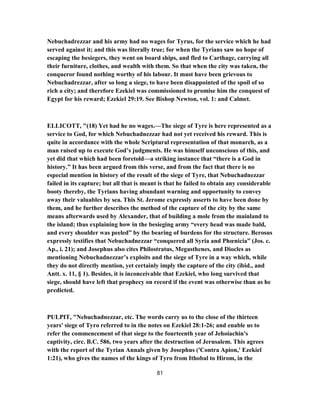
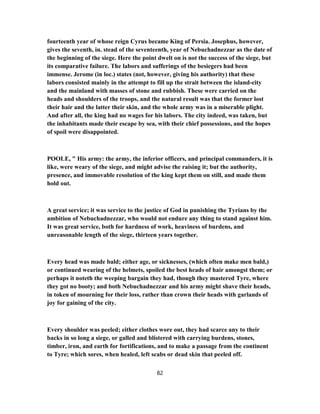
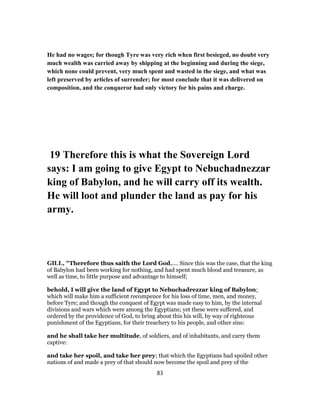
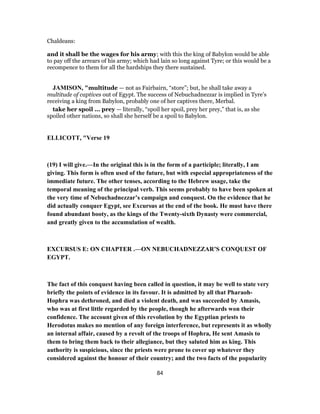
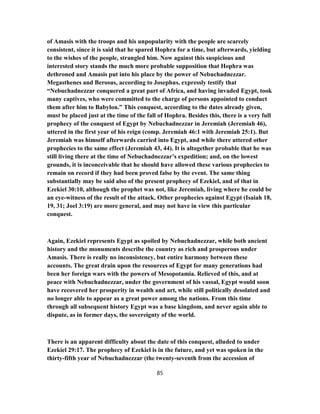
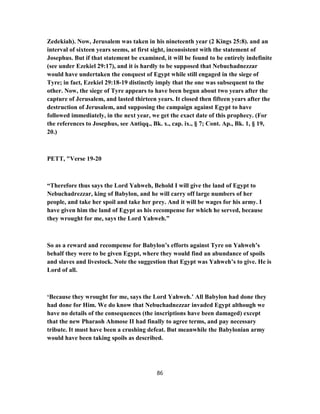
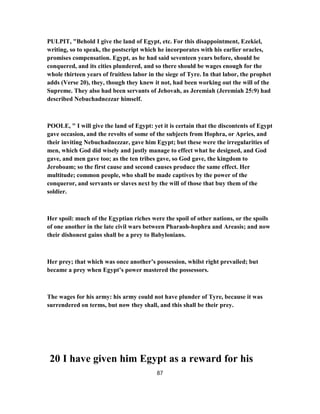
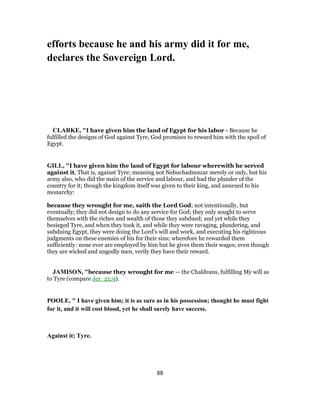
![They wrought for me; the proud, revengeful, covetous, and cruel Babylonians
designed themselves, and did work for themselves, but God had further, higher, and
more excellent ends, his work was doing by them who thought nothing less.
21 “On that day I will make a horn[c] grow for
the Israelites, and I will open your mouth among
them. Then they will know that I am the Lord.”
BARNES, "Eze_29:21
Egypt being the antagonist of the people of God, her overthrow inaugurated the
triumph of good over evil.
The horn ... - Or, “an horn to bud forth to the house of Israel.”
I will give thee the opening of the mouth - When these things should begin to
come to pass the prophet’s mouth should be opened to declare their meaning, and to
make known the end to which all was tending.
CLARKE, "Will I cause the horn of the house of Israel to bud - This may
refer generally to the restoration; but particularly to Zerubbabel, who became one of the
leaders of the people from Babylon. Or it may respect Daniel, or Mordecai, or Jeconiah,
who, about this time, was brought out of prison by Evil-merodach, and afterwards kindly
treated.
GILL, "In that day will I cause the horn of the house of Israel to bud forth,....
Not at the time of Egypt's destruction, unless it can be thought that this refers to the
advancement of Daniel in the court of Babylon; or to the taking of Jehoiachin out of
prison, and setting his throne above the rest of the kings; which events came to pass a
little after this: but rather this respects the time of Egypt's restoration forty years after,
when Cyrus came to the throne, and proclaimed liberty to the Jews to return to their
89](https://image.slidesharecdn.com/ezekiel29commentary-170120203858/85/Ezekiel-29-commentary-89-320.jpg)
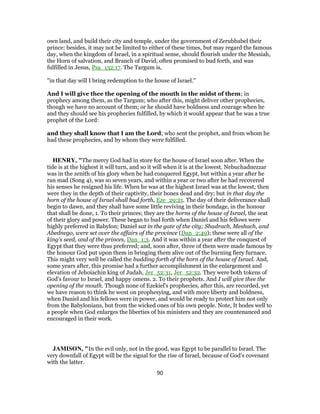

![salvation in Israel, in the church of the Lord, the word of prophecy would sound
forth in the richest measure."[18]
This characteristic of sweet promises of the ultimate victory of the people of God is a
hallmark of true prophecy. We should be disappointed if it were not here, just as it
is in countless other places throughout the Word of God.
COKE, "Verse 21
Ezekiel 29:21. In that day will I cause the horn, &c.— That is to say, after the
destruction of God's and his church's enemies, the kingdom and state of the Jews
shall flourish again, particularly under the Messiah, as is more clearly foretold,
chap. Ezekiel 34:23, &c. Ezekiel 37:21, &c. See also chap. Ezekiel 24:27.
REFLECTIONS.—1st, The date of this prophesy is observable. It was just at the
time when the Egyptian army was advancing to raise the siege of Jerusalem, and
when the Jews confidently expected relief from their approach. The vain hopes that
sinners entertain are often most sanguine, when their ruin is nearest.
The prophesy is directed against Egypt and her king, represented by a great dragon,
or crocodile, lying in the river Nile. We have here,
1. His pride. He lieth in the midst of his rivers, secure, at ease, and rolling in wealth
and pleasures; and hath said, My river is mine own, I have made it for myself; as if
he reigned independent of God, and owed to himself alone the monarchy that he
possessed. Thus pride calls God's gifts our own, and, self-idolaters, we leave him far
above out of our sight.
2. The judgment executed on Pharaoh. I am against thee, or above thee, able and
determined to punish his arrogance. God will put hooks in his jaws, and with all the
fish which stick to his scales, his numerous forces, will drag him out of his rivers,
92](https://image.slidesharecdn.com/ezekiel29commentary-170120203858/85/Ezekiel-29-commentary-92-320.jpg)
